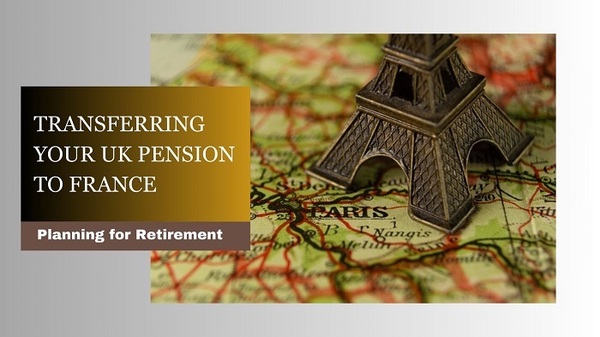Whether you are relocating to France in retirement, moving with your family or exploring the opportunity of life overseas, deciding whether to take your pension with you – and how to go about it – can make a significant difference to your future income.
There are multiple considerations, and the right decisions will depend on your expectations, intended retirement age, the type of pension funds you own, and the flexibility offered by your current pension provider.
The Chase Buchanan Wealth Management Bordeaux team explains some potential options, the pros and cons, and why we always recommend seeking professional financial advice before making any long-term decisions.
Managing Your Pension Savings When Moving to France
Finances are a key aspect of any international move, and choosing what to do with your UK-registered pension scheme is one of several tasks – but it isn’t something we’d suggest delaying or placing further down your list of priorities.
Leaving a pension in situ without taking any action can limit your future pension income, with the complexities of exposure to UK tax charges, currency risk, and potential caps on the pension commencement lump sum value you are permitted to withdraw.
Further, there is the possibility that the recently abolished Lifetime Allowance (LTA) will be reintroduced into the UK legislation following next year’s general election. Should that happen, owners of UK pension savings above £1 million, or anticipated to reach this value, will have further UK tax to account for, eroding the total value of their retirement wealth.
That said, an international pension transfer is far from the only solution.
Expatriates might, for example, decide to review the tax implications of reinvesting their pension funds into a UK-based Self-Invested Personal Pension (SIPP). They may also determine that leaving defined benefit pensions as they are is beneficial, particularly if the pension fund provides a generous guaranteed lifetime income.
The best way forward is to consult an accredited, regulated adviser with the appropriate knowledge and credentials to run through all the alternatives available and help you make informed choices.
How to Transfer a UK-Based Pension to an Overseas Pension Scheme
There are two primary ways British expatriates relocating to France transfer their pension assets:
Self-Invested Personal Pension (SIPP)
SIPP funds can remain in the UK, but are accessible to any pension fund holder, including British expatriates living in France. While individual schemes may offer different terms, a SIPP usually provides:
- A 25% lump sum drawdown from age 55 onward, without exposure to UK tax. Note that you may be subject to tax charges in France.
- Flexibility, where you can receive regular pension benefits or access periodic lump sums based on your requirements.
- Protection from the LTA should this be reinstated.
A SIPP may be a good prospect if you are unsure whether you will return to the UK at some point, wish to avoid possible exposure to pension transfer taxation or prefer a straightforward solution that allows you to select your own investments.
Recognised Overseas Pension Schemes (ROPS)
A ROPS, previously known as a Qualifying Recognised Overseas Pension Scheme (QROPS), must be approved by HMRC and offers different features, including:
- Up to a 30% tax-free pension drawdown as a lump sum from age 55 or, in some cases, from age 50. As with a SIPP, you may be liable to pay French income tax.
- Variable currency options, where expatriates can set up a ROPS in the same country as in their place of residence to remove currency exchange risks.
- Flexible income drawdown opportunities.
Any ROPS you transfer a UK pension fund to must be approved and meet HMRC’s criteria to avoid substantial penalties. Approved schemes change fairly often, with the list updated once every two weeks to reflect those overseas funds that have met specific UK rules.
Both pension transfers have pros and cons, but it is important to note that France has no HMRC-approved ROPS. Expatriates can opt for the singular Pension Scheme of the Officials of the European Union, an EU-wide fund, but there are no other funds within France.
Another option, should a ROPS transfer meet your objectives, would be to select an approved overseas pension fund within the European Economic Area (EEA), with Malta being one of the favoured locations for many pension schemes.
More detailed information about these possible transfer options is available through our free downloadable SIPPs vs ROPS Guide.
Tax Implications of Transferring Your UK Pension to France
The majority of pension transfers do not attract the 25% Overseas Transfer Charge, either because the expatriate selects a UK-based SIPP or because they are transferring a UK pension fund to the same country as their place of residence.
Rules apply throughout the EEA, so if you were to relocate to France and transfer your pension to a ROPS elsewhere in Europe, you would remain protected.
However, the ‘five-year rule’ applies, meaning an expatriate claiming transfer tax exemption must remain an EU resident for five consecutive tax years. Should they return to the UK, relocate outside of the EU or withdraw funds before age 55 within the initial five-year period, they may be exposed to UK pension taxes.
Breaking the UK pension rules can also attract additional penalties of as much as 55% of your pension wealth, so you must understand the conditions and ensure whichever transfer solution you select gives you the freedom and flexibility to access your pension assets as you wish.
After five years, an overseas scheme is no longer subject to UK jurisdiction. It will instead be regulated and taxable according to French tax laws and those relevant to the location of your pension fund.
In terms of ongoing tax liabilities, pension income will normally be subject to income tax, with the current tax rates beginning at 11% on earnings above €10,777. The highest tax band is 45%, which applies to revenues of over €168,994 within the tax year.
Non-residents living in France for part of the year are normally only required to declare and pay taxes on their locally earned income, whereas permanent or long-term tax residents are obliged to pay French taxes against their worldwide income.
For more information about transferring your UK pension to France or picking the most suitable solutions, please get in touch with our local team in Bordeaux or the Chase Buchanan Wealth Management UK Administration Centre.
Information Source: - https://chasebuchanan.com/transferring-your-uk-pension-to-france/




